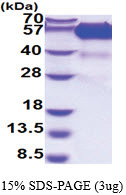CD120a / TNFR1 (30-211, hIgG-His tag) Human Protein
Other products for "TNFRSF1A"
Specifications
| Product Data | |
| Species | Human |
| Expression cDNA Clone or AA Sequence |
ADPLVPHLGD REKRDSVCPQ GKYIHPQNNS ICCTKCHKGT YLYNDCPGPG QDTDCRECES GSFTASENHL RHCLSCSKCR KEMGQVEISS CTVDRDTVCG CRKNQYRHYW SENLFQCFNC SLCLNGTVHL SCQEKQNTVC TCHAGFFLRE NECVSCSNCK KSLECTKLCL PQIENVKGTE DSGTTLEPKS CDKTHTCPPC PAPELLGGPS VFLFPPKPKD TLMISRTPEV TCVVVDVSHE DPEVKFNWYV DGVEVHNAKT KPREEQYNST YRVVSVLTVL HQDWLNGKEY KCKVSNKALP APIEKTISKA KGQPREPQVY TLPPSRDELT KNQVSLTCLV KGFYPSDIAV EWESNGQPEN NYKTTPPVLD SDGSFFLYSK LTVDKSRWQQ GNVFSCSVMH EALHNHYTQK SLSLSPGKHH HHHH
|
| Tag | hIgG-His-tag |
| Predicted MW | 47.7 kDa |
| Concentration | lot specific |
| Purity | >90% by SDS - PAGE |
| Buffer | Presentation State: Purified State: Liquid purified protein Buffer System: Phosphate Buffered Saline (pH 7.4) containing 10% glycerol. |
| Endotoxin | < 1.0 EU per 1 microgram of protein (determined by LAL method) |
| Preparation | Liquid purified protein |
| Storage | Store undiluted at 2-8°C for one week or (in aliquots) at -20°C to -80°C for longer. Avoid repeated freezing and thawing. |
| Stability | Shelf life: one year from despatch. |
| Reference Data | |
| RefSeq | NP_001056 |
| Locus ID | 7132 |
| UniProt ID | P19438 |
| Cytogenetics | 12p13.31 |
| Synonyms | CD120a; FPF; p55; p55-R; p60; TBP1; TNF-R; TNF-R-I; TNF-R55; TNFAR; TNFR1; TNFR55; TNFR60 |
| Summary | 'This gene encodes a member of the TNF receptor superfamily of proteins. The encoded receptor is found in membrane-bound and soluble forms that interact with membrane-bound and soluble forms, respectively, of its ligand, tumor necrosis factor alpha. Binding of membrane-bound tumor necrosis factor alpha to the membrane-bound receptor induces receptor trimerization and activation, which plays a role in cell survival, apoptosis, and inflammation. Proteolytic processing of the encoded receptor results in release of the soluble form of the receptor, which can interact with free tumor necrosis factor alpha to inhibit inflammation. Mutations in this gene underlie tumor necrosis factor receptor-associated periodic syndrome (TRAPS), characterized by fever, abdominal pain and other features. Mutations in this gene may also be associated with multiple sclerosis in human patients. [provided by RefSeq, Sep 2016]' |
| Protein Families | Druggable Genome, Secreted Protein, Transcription Factors, Transmembrane |
| Protein Pathways | Adipocytokine signaling pathway, Alzheimer's disease, Amyotrophic lateral sclerosis (ALS), Apoptosis, Cytokine-cytokine receptor interaction, MAPK signaling pathway |
Documents
| FAQs |
Resources
Recombinant Protein Resources |
{0} Product Review(s)
0 Product Review(s)
Submit review
Be the first one to submit a review
Product Citations
*Delivery time may vary from web posted schedule. Occasional delays may occur due to unforeseen
complexities in the preparation of your product. International customers may expect an additional 1-2 weeks
in shipping.






























































































































































































































































 Germany
Germany
 Japan
Japan
 United Kingdom
United Kingdom
 China
China
